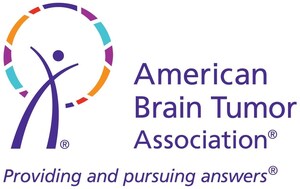CHICAGO, July 7, 2017 /PRNewswire-USNewswire/ -- Growing awareness of the individual yet interrelated emotional, psychological and physical reactions to a brain tumor diagnosis experienced by the brain tumor patient and caregiver, and the benefits of a formal treatment plan for both, is gaining traction among treatment teams. The American Brain Tumor Association's Annual Patient and Family Conferenced, entitled "Redefining Survivorship through Science, Technology and Clinical Innovation," being held Aug. 4-5 at the Westin O'Hare in Rosemont, Ill., will feature separate break-out sessions focusing on the patient's and the caregiver's unique supportive needs.
Margaretta Page, RN, MS, UCSF Neuro-Oncology Gordon Murray Caregiver Program, will discuss her experience in creating the first neuro-oncology caregiver program at UCSF and share some early caregiver survey data in a session entitled, "Improving Quality of Life for the Caregiver." Page's efforts to create the UCSF Neuro-Oncology Caregiver Program appear in a paper published in the June 2017 issue of Neuro-Oncology Practice.
"Neuro-oncology caregivers face unique challenges as they are caring for a loved one with a catastrophic, life-threatening diagnosis combined with progressive neurological decline that can produce great distress," Page said. "A tailored plan that includes information about the disease and disease transitions, the role of the caregiver, managing children in the home when a parent has a brain tumor, and the need for connection with others are among the high need areas."
Tobias Walbert, MD, PhD, MPH, Co-Director of the Hermelin Brain Tumor Center, Henry Ford Health System, is a board certified neurologist, neuro-oncologist and palliative care and hospice physician. His research focus includes helping patients and their families with symptom management, advance care planning, communication and end-of-life decision making.
Dr. Walbert, who believes that "cutting edge therapy needs to come together with a sense of family and a sense of hope," will share his approach to creating individualized supportive care plans for patients that begin with diagnosis and are evaluated and adapted to reflect evolving patient needs throughout the trajectory of the disease, in a breakout session entitled, "Supportive Care and Brain Tumors."
Break-out sessions are scheduled for Sat., Aug. 5. Additional topics include innovations in:
- International Low Grade Glioma (LGG) Patient Registry
- Diet and Nutrition – The Ketogenic Diet
- Focus on Function
- Depression and Mood Swings
- Seizure Management
- Fatigue and Fatigue Management
- Computerized Brain Training
The ABTA National Patient & Family Conference, Redefining Survivorship Through Science, Technology and Clinical Innovation is being held at the Westin O'Hare in Rosemont, Ill., August 4-5. Advance registration is encouraged; walk-in registration will be based upon space availability.
To view the conference program and register, visit www.braintumorconference.org, or call 800-886-ABTA (2282) or email [email protected].
ABOUT THE AMERICAN BRAIN TUMOR ASSOCIATION
Founded in 1973, the American Brain Tumor Association was the first national patient advocacy organization committed to funding brain tumor research and providing education and information for people of all tumor types and all ages. For more information, visit www.abta.org or call 800-886-ABTA (2282).
CONTACT: Jennifer Keljik, [email protected], 773-577-8790
SOURCE American Brain Tumor Association
Related Links
WANT YOUR COMPANY'S NEWS FEATURED ON PRNEWSWIRE.COM?
Newsrooms &
Influencers
Digital Media
Outlets
Journalists
Opted In





Share this article